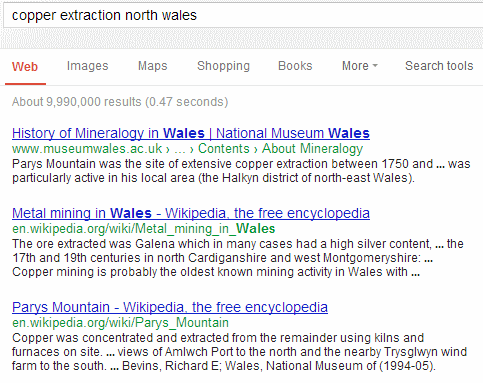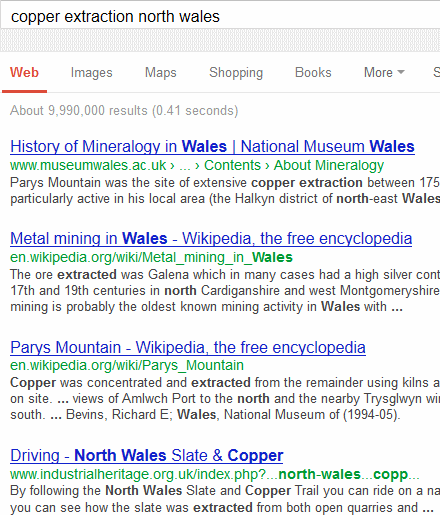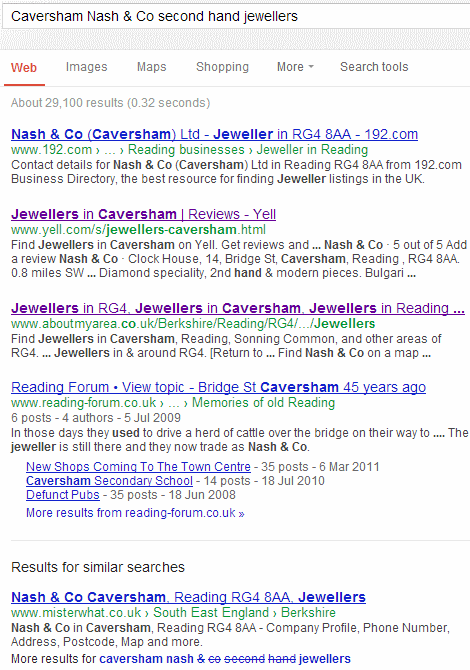April is going to be a very busy month for me this year. As well as speaking at conferences I am also giving six full day workshops so am having to prepare the presentations, handouts and notes well in advance. When it comes to the Google sessions the material the delegates receive never matches exactly what they see on their screens during the practicals. That’s par for the course where Google is concerned and it’s a great way of getting across to people how Google messes up enhances search results. The problem I had yesterday, and am still having this morning, is that Google seems to have dumped me into several major ‘live experiments’ and results keep changing second by second. The consequence is that it is impossible for me to pull together a set of consistent screen shots but I, and the delegates, will just have to live with that. And it makes a good story on the day!
If you don’t know what Google’s ‘live experiments’ are the YouTube video at http://www.youtube.com/watch?v=J5RZOU6vK4Q will enlighten you. In essence, Google tests out changes to its search and ranking algorithms on users before deciding whether or not to go ahead with the changes. It could be me or you who ends up being one of Google’s lab rats. We are not asked if we want to be part of the test nor are we told. Most of the time the changes are so minor that we don’t notice the difference but occasionally they lead to some very bizarre results. See my blog posting from a couple of years ago when Google decided that coots were really lions (http://www.rba.co.uk/wordpress/2011/02/12/google-decides-that-coots-are-really-lions/). What I’ve been seeing over the last couple of days is not in that league but extremely irritating all the same.
One of test searches is fairly straightforward – copper extraction north wales. This is what I saw:

What’s wrong with that you might ask. At first glance it looks as though Google is dropping terms from my search because none of them are emboldened in the extracts. On closer inspection, though, the terms and their synonyms are present. I ran Verbatim on the search and saw a similar set of results with no emboldening apart from words in the title.
I use Chrome as my default browser and wondering if it was an issue with that I tried Firefox. The emboldened terms reappeared.

Internet Explorer also displayed emboldened terms.
I went back to Chrome and ran the search in an Incognito window. The search terms appeared emboldened in the extracts.
Thinking the problem was due to me being signed in to a Google account I signed out and ran the search. No emboldened terms. I cleared the cache and cookies. No emboldened terms. I disconnected Chrome from my Google account. No emboldened terms. I disabled all of the extensions. No emboldened terms. It was clear that Google was not going to show me emboldened terms when using a normal Chrome window. Why is it so important? Because it is a quick way of initially assessing the relevance of the results. No emboldened terms in the extract suggests that they were not found in the text of the page. If this is indeed an experiment and not a local glitch on my system, and Google decides to roll this out to all users we are all going to waste a lot of time wading through irrelevant results.
On to possible experiment number 2. Google sometimes ignores the setting that tells it how many results to display on a page. I have set mine to 100 but occasionally it reverts to just 10. Refreshing the page or going into settings and saving them again usually works for me. This is a minor irritant, unlike experiment number 3.
Google has started showing just six results for some searches. Phil Bradley is one who is definitely not impressed with this (Google results – down to 6 on a page and most of those are wrong! ). Then I started seeing it for some of my own searches.

I didn’t see 6 results but 4! (As an aside, the emboldened search terms in the extract have returned). The fifth was a result for similar searches with an annotation that indicated ‘& co second hand’ had been omitted. A couple of the results were OK-ish but I was hoping for more detailed information. Is there really so little information for this query? Like Phil, when I clicked on to the next page I was back to sensible results. Unlike Phil, using Verbatim on the search worked for me and overrode the experiment, so again I was back to sensible results. This morning, I could not replicate the 6 results per page display.
Experiment number 4: annotations below the extracts. Some of these annotations look like headings from the pages themselves but others are not. I cannot replicate what I saw yesterday and didn’t take any screenshots of this one. I am definitely sure I didn’t dream it because a couple of my network on Twitter have reported similar experiences.
This continual round of disappearing, reappearing, disappearing “features” is infuriating. Yes, we can all go off and use other search engines but there are times when the type of content and level of coverage tempts us back. You do have to know how to use the advanced search commands to get anything sensible out of Google, but even then success is not guaranteed. This is an area I concentrate on in my workshops. The next one on Google is being organised by UKeiG in Manchester (see the UKeiG web site for details). The title “Make Google behave: techniques for better results” may seem a little overoptimistic given my own and other people’s experiences, but there are plenty of tricks we can employ to get usable results.
Given that Google is now just over 13 years old and a teenager it is not surprising that it has become somewhat truculent. It’s when it starts going through the silent grunting phase that we need to really start worrying.